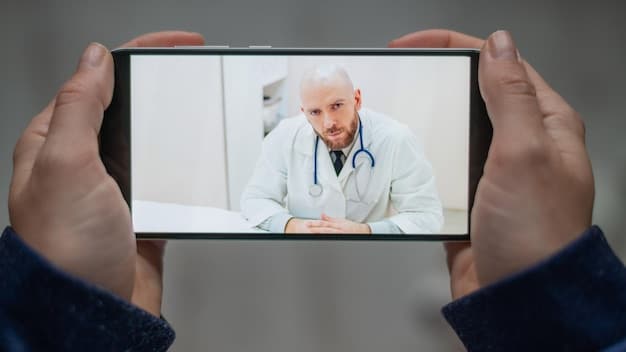The Future of Healthcare: Emerging Tech Transforming Patient Care by 2026

The Future of Healthcare: 3 Emerging Technologies Set to Transform Patient Care by 2026 includes AI-driven diagnostics, personalized medicine through genomics, and telehealth expansions, promising more efficient, accessible, and patient-centered healthcare.
The healthcare landscape is on the cusp of a dramatic transformation. By 2026, three emerging technologies are poised to revolutionize patient care, leading to earlier diagnoses, more personalized treatments, and increased access to healthcare services. These advancements aren’t just incremental improvements; they represent a paradigm shift in how we approach health and wellness.
Get ready to explore The Future of Healthcare: 3 Emerging Technologies Set to Transform Patient Care by 2026. We’ll dive into the specifics of each technology, examine their potential impact, and discuss the challenges that lie ahead.
Artificial Intelligence (AI)-Driven Diagnostics: Revolutionizing Early Detection
Artificial intelligence is rapidly changing the way diseases are diagnosed and treated. AI algorithms can analyze vast amounts of medical data, including images, lab results, and patient history, to identify patterns and anomalies that might be missed by human eyes. This leads to earlier and more accurate diagnoses, ultimately improving patient outcomes. Let’s delve deeper into how AI is making waves in healthcare.
Enhanced Image Analysis
AI excels at analyzing medical images, such as X-rays, CT scans, and MRIs. AI algorithms can detect subtle indicators of diseases, such as tumors, fractures, and aneurysms, often before they become symptomatic. This real-time insight helps in making informed decisions regarding patient treatment.
Predictive Analytics
AI can also predict a patient’s risk of developing certain diseases based on their medical history, genetics, and lifestyle. This allows doctors to implement preventive measures and personalized interventions, reducing the likelihood of disease progression. Consider the possibilities when you have the ability to predict potential diseases before developing.
- Faster Diagnosis: AI algorithms can process medical data much faster than humans, speeding up the diagnostic process.
- Improved Accuracy: AI can reduce diagnostic errors by identifying subtle patterns and anomalies.
- Personalized Treatment: AI insights can help tailor treatment plans to individual patient needs.
- Reduced Costs: Early and accurate diagnoses can help reduce healthcare costs associated with advanced-stage diseases.

AI-driven diagnostics is not without its challenges. Data privacy concerns, algorithmic bias, and the need for regulatory oversight are all important considerations. However, the potential benefits of AI in healthcare are undeniable. As AI technology continues to evolve, we can expect even more innovative applications that improve patient care and transform the healthcare industry from diagnosis to treatment.
Personalized Medicine Through Genomics: Tailoring Treatments to the Individual
Genomics, the study of an organism’s complete set of genes, is another emerging technology that is set to revolutionize healthcare. By analyzing a patient’s individual genetic makeup, doctors can develop personalized treatment plans that are more effective and have fewer side effects. This is a significant step towards more precise and tailored healthcare. Let’s look more closely.
Pharmacogenomics
Pharmacogenomics is the study of how genes affect a person’s response to drugs. By understanding a patient’s genetic profile, doctors can prescribe medications that are more likely to be effective and avoid those that may cause adverse reactions. This reduces the trial-and-error approach to medication management.
Precision Oncology
Cancer is a complex disease with many different genetic drivers. Precision oncology uses genomic sequencing to identify the specific genetic mutations that are driving a patient’s cancer. This allows doctors to select targeted therapies that are more likely to kill the cancer cells while sparing healthy tissues.
- Targeted Therapies: Genomic information allows for the development of therapies that target specific genetic mutations.
- Improved Drug Response: Pharmacogenomics helps predict how a patient will respond to different medications.
- Reduced Side Effects: Personalized medicine can minimize the side effects of treatment by avoiding ineffective or harmful drugs.
- Early Detection: Genomic screening can identify individuals at high risk for certain diseases, allowing for early intervention.
The Future of Healthcare: 3 Emerging Technologies Set to Transform Patient Care by 2026 wouldn’t be complete without genomics. The widespread adoption of personalized medicine through genomics faces several challenges, including the cost of genetic testing, the need for bioinformatics expertise, and ethical concerns around genetic privacy. Despite these challenges, the potential of genomics to transform healthcare that is patient-focused is enormous. As genomic technologies become more affordable and accessible, we can expect to see personalized medicine becoming the standard of care in many areas of healthcare.
Telehealth Expansions: Increasing Access to Care for All
Telehealth, the use of technology to deliver healthcare services remotely, has experienced rapid growth in recent years. The COVID-19 pandemic accelerated the adoption of telehealth, as healthcare providers sought to provide care to patients while minimizing the risk of infection. Looking ahead to 2026, telehealth is expected to play an even larger role in healthcare delivery, expanding access to care for people in rural areas, those with disabilities, and those who have difficulty traveling to see a doctor.
Remote Monitoring
Remote monitoring uses wearable devices and other technologies to track a patient’s vital signs, activity levels, and other health data from afar. This allows doctors to monitor patients with chronic conditions, such as diabetes, heart failure, and asthma, more closely and intervene early if problems arise. It also contributes to a more efficient and streamlined healthcare system.
Virtual Consultations
Virtual consultations allow patients to see a doctor or other healthcare provider via video conferencing. This eliminates the need for patients to travel to a doctor’s office, saving time and money. Virtual consultations can be used for a wide range of services, including routine checkups, chronic disease management, and mental health counseling.
- Increased Access: Telehealth expands access to care for people in remote areas and those with mobility issues.
- Improved Convenience: Virtual consultations and remote monitoring save patients time and money.
- Enhanced Patient Engagement: Telehealth tools can help patients become more engaged in their own care.
- Reduced Costs: Telehealth can reduce healthcare costs by minimizing the need for in-person visits and hospitalizations.

The expansion of telehealth faces several challenges, including the need for better broadband infrastructure in rural areas, concerns about data security and privacy, and the need for regulatory frameworks that support telehealth services. Despite these challenges, the potential of telehealth to transform healthcare is immense. As technology continues to evolve and become more affordable, we can expect to see telehealth playing a central role in the future of healthcare that focuses on being accessible.
Challenges and Considerations for the Future of Healthcare
While The Future of Healthcare: 3 Emerging Technologies Set to Transform Patient Care by 2026 holds immense promise, it’s essential to acknowledge and address the challenges that come with such rapid advancements. Navigating ethical considerations, ensuring equitable access, and maintaining patient privacy are crucial for a successful and responsible integration of these technologies.
Data Privacy and Security
The increased reliance on digital health data raises significant concerns about privacy and security. Robust measures must be in place to protect sensitive patient information from cyber threats and unauthorized access, guaranteeing that patient data is handled with the utmost care and respect.
Ethical Considerations
As AI and genomics become more integrated into healthcare, ethical considerations surrounding algorithmic bias, genetic discrimination, and informed consent must be carefully addressed. Ensuring fairness, transparency, and accountability in the use of these technologies is paramount to maintaining public trust and preventing unintended consequences.
Equitable Access
The benefits of emerging healthcare technologies must be accessible to all, regardless of socioeconomic status, geographic location, or other factors. Efforts to bridge the digital divide and address disparities in access to care are essential to ensure that everyone can benefit from these advancements. Consider all of the factors that go into ensuring a more equitable future.
Addressing these challenges requires a collaborative effort involving healthcare providers, policymakers, technology developers, and patients. By proactively addressing these issues, we can create a future of healthcare that is not only innovative but also ethical, equitable, and patient-centered. This thoughtful integration will ensure the safety of patients, while utilizing new innovations.
Preparing for the Transformation: What Healthcare Professionals and Patients Need to Know
The ongoing transformation of healthcare requires both healthcare professionals and patients to adapt and embrace new ways of delivering and receiving care. Staying informed, developing new skills, and actively participating in the decision-making process are essential for navigating this evolving landscape. What information is essential for both sides of healthcare to be fully informed?
Embracing Continuous Learning
Healthcare professionals must commit to continuous learning and professional development to stay abreast of the latest advancements in AI, genomics, and telehealth. Training programs, workshops, and online resources can help them acquire the necessary knowledge and skills to effectively utilize these technologies in clinical practice. Education and proper training can ensure optimal results and usage.
Promoting Digital Literacy
Patients need to develop digital literacy skills to effectively engage with telehealth services and utilize remote monitoring devices. Healthcare providers can play a crucial role in educating patients about these technologies and providing support to those who may need assistance.
Engaging in Shared Decision-Making
Patients should actively participate in shared decision-making with their healthcare providers, especially when it comes to personalized medicine and treatment plans based on genomic information. Understanding the benefits, risks, and limitations of these approaches is essential for making informed choices that align with their values and preferences.
By taking proactive steps to prepare for the transformation of healthcare, both healthcare professionals and patients can contribute to a future where technology enhances the quality, accessibility, and affordability of care. There is still learning to do, and the future is a long way away from being perfect. However, being informed is essential for successful outcomes.
| Key Point | Brief Description |
|---|---|
| 🤖 AI Diagnostics | AI enhances image analysis and predicts disease risks, leading to earlier, accurate diagnoses. |
| 🧬 Personalized Medicine | Genomics tailors treatments, optimizing drug response and reducing side effects via targeted therapies. |
| 📱 Telehealth Expansions | Telehealth boosts access and convenience through remote monitoring and consultations. |
| 🔒 Ethical Considerations | Data privacy and ethical issues must be addressed to ensure fair and secure tech use in healthcare. |
Frequently Asked Questions
AI enhances diagnostic accuracy through advanced image analysis and predictive analytics, enabling earlier detection and personalized treatments, ultimately improving patient outcomes.
Personalized medicine allows for targeted therapies, improved drug response, reduced side effects, and early detection of diseases based on individual genetic profiles.
Telehealth increases healthcare access by offering remote monitoring and virtual consultations, reducing travel time and costs, and enhancing patient engagement through digital tools.
Ethical considerations involve data privacy, algorithmic bias, and informed consent. Ensuring fairness, transparency, and accountability are essential for responsible AI implementation.
Healthcare professionals should embrace continuous learning to stay updated on AI, genomics, and telehealth, ensuring competent and ethical application of these technologies in patient care.
Conclusion
The Future of Healthcare: 3 Emerging Technologies Set to Transform Patient Care by 2026 promises to reshape how we approach health, offering earlier diagnoses, tailored treatments, and wider access. Embracing these advancements while addressing the associated challenges will pave the way for a more efficient and patient-centric healthcare system.
By focusing on continuous learning, ethical considerations, and equitable access, we can ensure that the benefits of these technologies are realized by all, leading to healthier and more fulfilling lives for individuals and communities alike.





